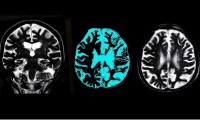-
Multimodal intervention approach shows promise in managing and reversing cognitive impairment
- Source: drugdu
- 202
- August 18, 2023
-
Quest Launches Alzheimer’s Beta-Amyloid Blood Test for Consumers
- Source: drugdu
- 215
- August 3, 2023
-
Biogen, working through a ‘transition,’ plots 1,000 more layoffs by 2025
- Source: drugdu
- 117
- July 27, 2023
-
Acumen Shares Positive Results for Investigational Alzheimer’s Disease Therapy at AAIC
- Source: drugdu
- 123
- July 19, 2023
-
Taking good care of your teeth may be good for your brain, study suggests
- Source: drugdu
- 110
- July 7, 2023
-
Lack of sleep found to lessen cognitive benefits of physical activity
- Source: drugdu
- 108
- July 7, 2023
-
Fluctuating blood lipid levels linked with higher risk of Alzheimer’s disease, study finds
- Source: drugdu
- 115
- July 7, 2023
-
Scientists develop universal donor stem cell therapy to treat degenerative brain diseases in a preclinical study
- Source: drugdu
- 137
- June 17, 2023
-
Exploring the viability of a new treatment for vascular dementia
- Source: drugdu
- 115
- June 11, 2023
-
FDA Indicates Potential Full Approval for Eisai & Biogen’s Leqembi Ahead of Adcomm
- Source: drugdu
- 102
- June 10, 2023
your submission has already been received.
OK
Subscribe
Please enter a valid Email address!
Submit
The most relevant industry news & insight will be sent to you every two weeks.













